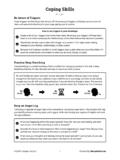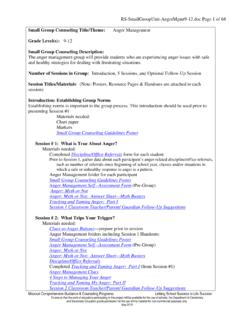Transcription of ANGER MANAGEMENT TECHNIQUES - defoore.com
1 ANGER MANAGEMENT TECHNIQUES By William G. DeFoore, William G. DeFoore, , 2 Copyright 2007 William Gray DeFoore All rights reserved. No part of this Ebook may be used or reproduced in any manner without written permission of the author, except for brief quotations used in reviews and critiques. This book is a work of non-fiction. Any resemblance to actual events, settings or persons, living or dead, is entirely coincidental. Produced in the United States of America First edition 2007 Most recent update 2014 William G. DeFoore, , 3 Table of Contents Page Number Introduction 4-5 Chapter One: Understanding ANGER 6-8 Chapter Two: ANGER Assessment Scale 9-11 Chapter Three: Quiet ANGER Release 12-14 Chapter Four: Physical and Vocal ANGER Release 15-19 Chapter Five: Emotional Healing Exercises 20-22 Chapter Six: Healthy ANGER 23-25 Chapter Seven: ANGER Communication Skills 26-29 Chapter Eight: Your Spiritual Power 30-31 Bibliography 32 Additional Resources 33 About the Author 34 William G.
2 DeFoore, , 4 INTRODUCTION ANGER is a natural, healthy emotion. It is simply a feeling you have when you are threatened or opposed. There is nothing wrong with having that feeling. The question is: what do you do with it? If you just stuff your ANGER , you can make yourself sick. If you blow up at others, you ll have problems in your relationships. In this program, we will look at ways for you to understand, manage and express your ANGER so that it is an asset to you and not a problem for you, your loved ones, or associates. You may already know that you have a problem with ANGER .
3 If you re not sure, here are some things to consider: Indicators That You Have An ANGER Problem When you get angry, you don t get over it. Sometimes it lasts until you explode, or it may go inside to fuel the fires of your rage. You may be one who holds a grudge. This is not doing you or anyone any good. Maybe you never get angry: you just don t have the emotion. There are times when you know you should be angry, but the emotion just doesn t seem to come. Your ANGER is watered down and you never fully release it. This will lead to other emotional problems and possibly illness as well.
4 You may be someone who feels frustrated, disappointed or irritable much of the time, but you really never show your ANGER . ANGER may be an unacceptable emotion to you, whereas frustration, disappointment or irritability are acceptable. This can interfere with or prevent any meaningful level of fulfillment or joy in life. William G. DeFoore, , 5 Perhaps you are sarcastic or cynical about yourself, others or the world around you. You may tease others with velvet daggers in some of your jokes, only to be surprised when they don t want to be around you. You don t openly express ANGER but it is leaking out all of the time.
5 This can lead to tremendous unhappiness for you and those who are close to you. You may be someone who feels depressed frequently, or for long periods of time. You don t express ANGER openly but tend to take it out on yourself without even realizing it. This can lead to suicidal thoughts and behavior or perhaps major illness. You may be someone who is angry all of the time. You may be verbally, emotionally or physically abusive to others in personal and professional relationships. This doesn t mean that you are a bad person but it certainly means you need to learn to manage your ANGER .
6 If you have indeed been abusive, it is almost certain that you will need professional help to work through your problems with ANGER . The important thing is that you don t give up on yourself with thoughts like, That s just the way I am. If you have the will to change, you can change. Like many people, you may feel powerless in your own life powerless to make the changes you choose to reach your goals. Though you may not use the word, you possibly feel like a victim much of the time. You may have many ways to explain why you can t live your dreams, all of which seem very reasonable to you.
7 The point is that if you are denying your power by denying your emotions, you are getting in your own way. To claim all of your emotions as your allies, and to express them in healthy ways is to maximize your resources for your own expression of purpose in life. I want you to consider something: you have good reason to be angry. How you express it may be unreasonable, but that doesn t mean you don t have good reasons for it. Possible Reasons For ANGER We get angry because we ve been hurt in some way, and we are afraid of being hurt again. We get angry because we don t get our way and maybe we are used to getting our way.
8 We get angry because that s what our parents did. We may get angry because deep inside we remember being abused, neglected, or William G. DeFoore, , 6 abandoned in some way and we are afraid of it happening again. We may even be angry because of a loss we have experienced and we are not through grieving that loss. These are all good reasons to be angry, yet they are not good reasons for harming yourself or anyone else. ANGER doesn t have to hurt. In this program you will learn about healthy ANGER and how to express it in healthy ways. William G.
9 DeFoore, , 7 Chapter One: Understanding ANGER ANGER , Your Body and Your Brain Your ANGER lives in your body. You ve heard the phrase, Talk it out as a recommended way of resolving ANGER and other problems in relationships. This works, but only if the physical and emotional components of your ANGER are under control. When you get angry, your body might get hot, your muscles tense, your heart pound, and your thoughts race. This is not a time for trying to talk to somebody about your feelings. They won t want to listen. By itself, ANGER is not a good communicator. As a pure, raw emotion, ANGER only wants to control the threat or threatening person.
10 Have you ever noticed how when people are really angry, they re not all that smart? Well, this is true for all of us. In extreme ANGER or extreme fear, we re just not as intelligent as we are when we are calm. In his ground-breaking book, Emotional Intelligence, Daniel Goleman explains how extreme emotion can actually shut down the higher functions of the brain: a process he calls emotional high jacking. This is where strong emotions interfere William G. DeFoore, , 8 with good decision-making. This is where good people end up hurting the ones they love or doing things they later regret.







